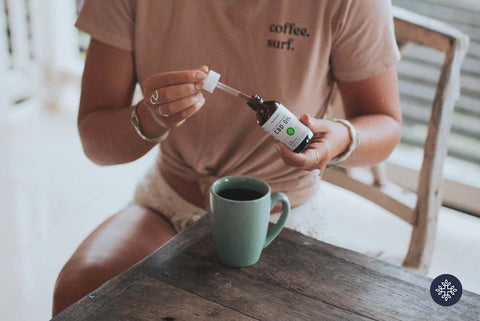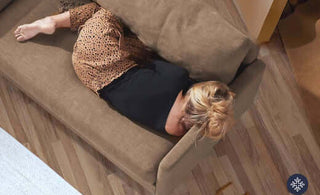A question many people have about CBD is, "Will it make me feel tired?"
To answer that question, it's important first to understand how CBD works. Cannabidiol (CBD) is one of the many naturally occurring compounds harvested in cannabis plants proven to offer a long list of health benefits, including a good night's sleep without concerning side effects.
Does CBD Make You Tired?
CBD may produce a sense of contentment by slowing the breakdown of anandamide, which may help you feel more relaxed, leading to better sleep. However, this unique interaction simply isn't enough to produce sedative effects.
Some users report, "CBD makes me sleepy" and reach for CBD oil as a natural sleep aid. Simultaneously, many other users turn to CBD to help them feel more alert and clear-headed. So, does CBD make you sleepy or awake?
Researchers are still looking to understand CBD's effects and pharmacological pathways fully, but it's believed that CBD's interaction in the endocannabinoid system helps to regulate the sleep-wake cycle through its relaxation effect.
Some factors that may influence how taking CBD makes you feel may include:
- Genetics
- Lifestyle
- Dosage
- Type of CBD drops you're taking
How the CBD Dosage Affects Your Tiredness
Figuring out your ideal dosage can be tricky, as people respond to CBD differently, and sometimes your body responds the next day.
If you're planning on taking CBD and have an underlying health condition, we recommend speaking with your healthcare practitioner so that they can provide you with better guidance given your condition, medical history, and medication you may be taking.
For those using CBD products recreationally, dosing can be a perplexing field to navigate, and the only way through it is with some experimentation. If you're new to CBD, always start with lighter doses (as recommended on the label) and gradually increase for a week until you reach your desired effects. If you jump the gun too quickly with large doses, you may feel slight discomfort, but it could help trigger your eyes to shut.
A 2017 review of sleep and cannabis in the Journal of Current Psychiatry reported that CBD interacts with the receptors in our brains that govern sleep/wake cycles. This means that CBD making you feel more alert during the day, can naturally contribute to you feeling more relaxed and ready for sleep at night.
How Does CBD Make You Tired?
How much CBD you take can affect how CBD oil makes you feel.
At high doses, CBD may increase Gamma-Aminobutyric Acid (GABA) activity in the brain.
GABA is a neurotransmitter best known as the "brake pedal" to the stress response in an overly stimulated central nervous system. GABA in the brain pumps the brakes on the fight-or-flight response, helping to induce calmness and relaxation that can help you fall asleep [ 2].
For those looking to gain CBD benefits for sleep support, it's recommended you take higher doses of CBD as you're winding down for bed.
Full spectrum CBD, containing a natural range of cannabinoids (alongside THC and CBD) found in the hemp plant, is also known to have stronger effects than CBD isolate.
You can also incorporate other sleep hygiene practices to improve your sleep quality, including:
- Avoiding screen time in the evenings
- Avoid caffeine in the afternoon
- Getting regular exercise during the day, but avoiding heavy exercise before bed
- Set a regular sleep and wake time
- Set your room temperature to a cooler temperature
CBD May Support Better Sleep Quality
CBD itself does not have a direct sedative effect. For many people, falling asleep isn't the issue, but staying asleep to get deep restorative sleep is.
REM (Rapid Eye Movement) is a cycle of sleep that occurs about 90 minutes after falling asleep. It's called REM because our eyes move quickly behind the eyelids, and our brains are the most active, undergoing renewal.
As CBD may help slow down the stress response, you're not as likely to be disturbed from sleep, allowing you to get into the deeper, more restorative sleep phase so that you wake up feeling well-rested and energized in the morning.
Always make sure you're shopping CBD oil for sleep with high-quality ingredients and third-party lab tests to back up its contents.
How To Choose CBD For Sleep
Potency
All CBD drops will be labeled with a concentration of CBD in MG on the package.
It can vary from 500MG per bottle all the way to 12,000MG, so choosing the appropriate potency is essential to getting the desired benefits you seek.
To get the most benefits for sleep support, you may want to consider a high potency of CBD oil so that you can achieve higher doses in smaller amounts of oil. This will be the most cost-effective option over time.
The Side Effects Of CBD
Countless studies explore the safety of CBD and have found that CBD is a safe compound that's well-tolerated in humans, even in the strongest CBD Oil doses over a long time [5].
However, that's not to say that CBD is without side effects. Thankfully, the adverse effects of CBD are short-term, only lasting for as long as the compound remains active in your system (3–5 hours). Some of the short-term side effects of CBD include:
- Drowsiness
- Lethargy
- Nausea
- Vomiting
- Diarrhea
- Changes in appetite
Most of these side effects arise when you've taken too much CBD. Mostly its how you take it and how much you take it to avoid these. For example, a properly dosed CBD can help nausea, but may also cause you drowsy if taken too much. If you find that CBD makes you drowsy or makes you feel any of these side effects, you may need to adjust your CBD dose.
Can CBD Make You Tired?

For some, CBD can make them feel tired or drowsy. For others, CBD is their go-to supplement to support their focus and alertness. The point is that CBD's diverse effects may produce different results for individuals.
If you're looking to use CBD to support your sleep, you should take larger doses as CBD has been shown to provide calming and relaxing benefits in higher quantities. This may be enough to help you fall asleep and stay asleep through the night.
FAQ
Does CBD make you tired?
CBD may cause drowsiness in some individuals due to its potential to interact with the body's endocannabinoid system and promote relaxation. However, its effects on sleepiness can differ based on factors like dosage, individual tolerance, and the type of CBD product used.
Why does CBD make me so sleepy?
CBD may cause drowsiness due to its interaction with the endocannabinoid system, specifically by increasing the levels of the neurotransmitter adenosine, which promotes relaxation and sleepiness. CBD may also affect serotonin receptors, contributing to its calming effects.
Resources:
- Huestis, M. A., Gorelick, D. A., Heishman, S. J., Preston, K. L., Nelson, R. A., Moolchan, E. T., & Frank, R. A. (2001). Blockade of effects of smoked marijuana by the CB1-selective cannabinoid receptor antagonist SR141716. Archives of general psychiatry, 58(4), 322-328.
- Bakas, T., Van Nieuwenhuijzen, P. S., Devenish, S. O., McGregor, I. S., Arnold, J. C., & Chebib, M. (2017). The direct actions of cannabidiol and 2-arachidonoyl glycerol at GABAA receptors. Pharmacological research, 119, 358-370.
- Costenla, A. R., Cunha, R. A., & De Mendonça, A. (2010). Caffeine, adenosine receptors, and synaptic plasticity. Journal of Alzheimer's Disease, 20(s1), S25-S34.
- Machado Bergamaschi, M., Helena Costa Queiroz, R., Waldo Zuardi, A., & Crippa, A. S. (2011). Safety and side effects of cannabidiol, a Cannabis sativa constituent. Current drug safety, 6(4), 237-249.
- De Gregorio, D., McLaughlin, R. J., Posa, L., Ochoa-Sanchez, R., Enns, J., Lopez-Canul, M., ... & Gobbi, G. (2019). Cannabidiol modulates serotonergic transmission and reverses both allodynia and anxiety-like behavior in a model of neuropathic pain. Pain, 160(1), 136.
Disclaimer
The statements made regarding these products have not been evaluated by the Food and Drug Administration. These products are not intended to diagnose, treat, cure or prevent any disease. All information presented here is not meant as a substitute for or alternative to information from health care practitioners. Please consult your health care professional about potential interactions or other possible complications before using any product.


